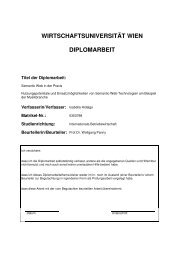Wirtschaftsuniversität Wien Magisterarbeit - SemanticLab
Wirtschaftsuniversität Wien Magisterarbeit - SemanticLab
Wirtschaftsuniversität Wien Magisterarbeit - SemanticLab
Create successful ePaper yourself
Turn your PDF publications into a flip-book with our unique Google optimized e-Paper software.
2.4. Privacy sensitive technologies<br />
The following section provides (technical) background information about the most important<br />
privacy relevant technologies and methodologies used on the Internet.<br />
2.4.1. Cookies<br />
A cookie is a small piece of information saved on the hard-disk of a computer. For<br />
security reasons, a cookie can only be read by the website that set the cookie on the<br />
users’ computer, that is cookies which were set by “google.com” can only be read by<br />
“google.com”. It can be distinguished between first- and third-party cookies. A firstparty<br />
cookie is a cookie which is set from a website which the users is currently visiting,<br />
whereas a third-party cookie is a cookie which is set by a third-party (such as<br />
an advertisement-provider) on a domain by displaying an external image or the like<br />
(e.g. when browsing “nyt.com” a cookie is set by “doubleclick.com” by displaying an<br />
advertisement on “nyt.com”) [W3Cd].<br />
2.4.1.1. Purpose<br />
Cookies were developed due to technical restrictions of the Internet protocol HTTP 4<br />
which is stateless, that means that after a request has been successfully processed, there<br />
is no connection between the client and the server anymore [W3Cd]. This can lead to<br />
problems with some Internet applications such as shopping carts: to successfully shop on<br />
a website, the website has to know which users put which products into their shopping<br />
carts. However, this is not possible without knowing the session-IDs 5 of the users. That<br />
is where cookies come into play. Cookies are (among other things) used to store session<br />
information and user preferences on a computer [Coo].<br />
2.4.1.2. Collected data<br />
Although cookies cannot be used to steal information from a computer, they can collect<br />
data which was provided during a session on a website. If users, for example, provide<br />
user names and e-mail addresses on a form on a website, these data can be stored in a<br />
cookie and entered into the form if users visit this website again [W3Cd].<br />
2.4.1.3. Threats to privacy<br />
This usage of cookies definitely makes sense, for example to store users’ preferences on a<br />
website. On the other hand, it can also be used for other purposes which pose a threat to<br />
privacy: tracking users. Although a cookie must always be restricted to a domain-name<br />
(such as google.com) and therefore cookies cannot be read by other websites, third-party<br />
4HTTP stands for Hyper Text Transfer Protocol and takes care of requesting and sending information<br />
from clients and servers<br />
5A session-ID is a unique combination of characters to identify users on a website<br />
14





